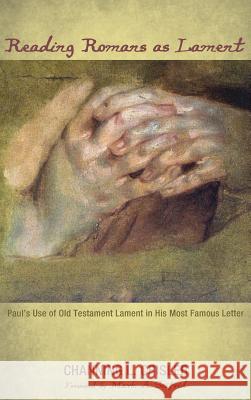Reading Romans as Lament » książka
Reading Romans as Lament
ISBN-13: 9781498232180 / Angielski / Twarda / 2016 / 252 str.
Reading Romans as Lament
ISBN-13: 9781498232180 / Angielski / Twarda / 2016 / 252 str.
(netto: 189,80 VAT: 5%)
Najniższa cena z 30 dni: 197,11
ok. 16-18 dni roboczych.
Darmowa dostawa!
Reading Romans as Lament examines how and why Paul uses such a high volume of Old Testament lament in his letter to the Romans. Lament is not merely a poignant cry of distress, but a distinct form of prayer scattered across the pages of the Old Testament. It contains a distinct literary footprint and theology. Although often overlooked, Romans contains a great deal of this prayer form through its various lament citations and echoes. When these citations and echoes are heard, it impacts the interpretation of the letter's argumentation and sheds historical light on suffering in the early church. Building on the work of both Old Testament scholarship and recent trends in Pauline Studies, most notably Claus Westermann and Richard B. Hays, this book explores how Paul uses the language and theology of Old Testament lament to address the tension between what his gospel promises and the pain his listeners experience. The echoes of lament in Romans indicate that suffering stems from various sources, but they share a common concern with divine wrath. The experience of pain, including concern over God's wrath, is a reality for the ""righteous"" in Rome. Paul consistently answers their cries of distress with the gospel. ""Channing Crisler's study on lament opens new windows in the study of Romans. His study is intriguing and filled with exegetical insights, and we can be grateful for this contribution to scholarship."" -- Thomas R. Schreiner, James Buchanan Harrison Professor of New Testament Interpretation, Associate Dean, The Southern Baptist Theological Seminary ""Hebrew Bible specialists have been exploring the genre of lament, but such passages figure also in the New Testament. Building on the work of Mark A. Seifrid, Dr. Channing Crisler has offered the first comprehensive analysis of Romans from the point of view of the lament passages that Paul echoes from the Hebrew Bible. Paul's gospel promises God's intervention in righteousness on behalf of those suffering from divine wrath because of sin."" --A. Andrew Das, Professor of Religious Studies, Elmhurst College ""With this compelling study of Paul's letter to the Romans, Channing Crisler helps fill an important gap in New Testament scholarship--the study of how profoundly the prayer of lament shapes the gospel proclamation. Through his probing and thorough exposition, Criswell convincingly demonstrates that the pattern of Old Testament lament is deeply woven into the fabric of Romans."" --Rebekah Eklund, Loyola University Maryland, author of Jesus Wept: The Significance of Jesus' Laments in the New Testament Channing L. Crisler is Assistant Professor of New Testament and Greek in the Clamp School of Divinity at Anderson University, SC.
Reading Romans as Lament examines how and why Paul uses such a high volume of Old Testament lament in his letter to the Romans. Lament is not merely a poignant cry of distress, but a distinct form of prayer scattered across the pages of the Old Testament. It contains a distinct literary footprint and theology. Although often overlooked, Romans contains a great deal of this prayer form through its various lament citations and echoes. When these citations and echoes are heard, it impacts the interpretation of the letters argumentation and sheds historical light on suffering in the early church. Building on the work of both Old Testament scholarship and recent trends in Pauline Studies, most notably Claus Westermann and Richard B. Hays, this book explores how Paul uses the language and theology of Old Testament lament to address the tension between what his gospel promises and the pain his listeners experience. The echoes of lament in Romans indicate that suffering stems from various sources, but they share a common concern with divine wrath. The experience of pain, including concern over Gods wrath, is a reality for the ""righteous"" in Rome. Paul consistently answers their cries of distress with the gospel.""Channing Crislers study on lament opens new windows in the study of Romans. His study is intriguing and filled with exegetical insights, and we can be grateful for this contribution to scholarship.""-- Thomas R. Schreiner, James Buchanan Harrison Professor of New Testament Interpretation, Associate Dean, The Southern Baptist Theological Seminary""Hebrew Bible specialists have been exploring the genre of lament, but such passages figure also in the New Testament. Building on the work of Mark A. Seifrid, Dr. Channing Crisler has offered the first comprehensive analysis of Romans from the point of view of the lament passages that Paul echoes from the Hebrew Bible. Pauls gospel promises Gods intervention in righteousness on behalf of those suffering from divine wrath because of sin.""--A. Andrew Das, Professor of Religious Studies, Elmhurst College""With this compelling study of Pauls letter to the Romans, Channing Crisler helps fill an important gap in New Testament scholarship--the study of how profoundly the prayer of lament shapes the gospel proclamation. Through his probing and thorough exposition, Criswell convincingly demonstrates that the pattern of Old Testament lament is deeply woven into the fabric of Romans."" --Rebekah Eklund, Loyola University Maryland, author of Jesus Wept: The Significance of Jesus Laments in the New TestamentChanning L. Crisler is Assistant Professor of New Testament and Greek in the Clamp School of Divinity at Anderson University, SC.











